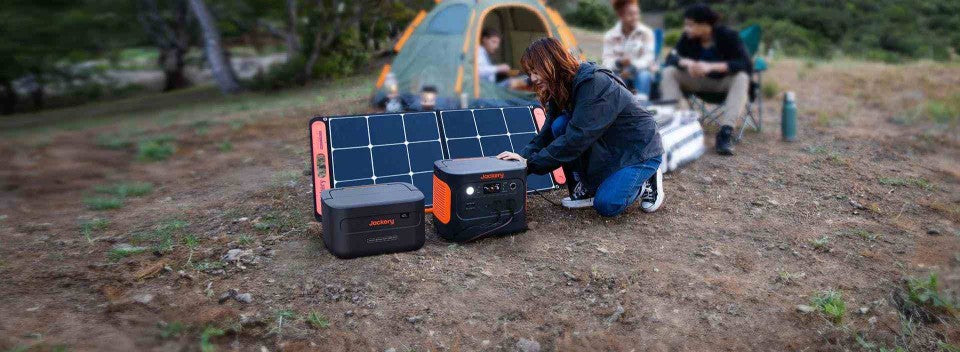Many people think summer in the UK is not hot, but it is usually characterised by cloudy days and frequent rainfall. However, in recent years, the weather pattern in the UK has changed significantly, and heatwaves have become more frequent. Many are increasingly concerned that such extreme heat will hurt life and health.
On this page, we will discuss the UK heatwave 2024, including why the UK frequently experiences heatwaves and the harm caused by heatwaves, and we will also talk about practical measures to prevent or deal with heatwaves.
Furthermore, you may spend more on cooling appliances indoors or outdoors. At that time, this summer, having a Jackery Portable Power Station paired with Jackery Solar Panels to charge cooling devices and appliances seems far more critical.
|
Key Takeaways: |
|
A heatwave is a period of scorching weather accompanied by high humidity. One study found that approximately 489,000 people died each year from heat exposure between 2000 and 2019, including more than 70,000 deaths during the European heatwave in 2003. The UK experienced three heatwaves in the summer of 2022, from 15 to 17 June, 17 to 19 July, and 9 to 15 August. The Met Office says 2024 could be the hottest year on record. While the heat will be felt across the UK, south-east England is expected to be hot. We recommend Jackery Explorer 1000 v2 and 1000 Plus to charge your cooling appliances, such as the fan, fan box, cooler, and more. |
What Is A Heatwave?
Generally speaking, a heatwave is when temperatures are above average for several days, but this is not always true. The Met Office defines a heatwave as "a prolonged period of hot weather relative to expected conditions for the time of year in the region, which may be accompanied by high humidity."
More specifically, a heatwave is a duration of extreme temperatures that may occur alongside elevated humidity, particularly in nations with maritime climates.
Heatwaves transpire when a high-pressure system remains stationary over a region, confining heated air at the surface and obstructing the influx of cooler air. The system acts like a dome, causing clear skies, more sunshine, and further temperature increases.

Hazards of Heatwaves
What are the effects of heat waves? One study found that approximately 489,000 people died each year from heat exposure between 2000 and 2019, including more than 70,000 deaths during the European heatwave in 2003.
So, it can be seen that heatwaves are one of the most dangerous natural hazards, which can cause serious health risks, infrastructure stress, and environmental impacts. They are, therefore, major weather events that need to be carefully monitored and responded to.
Here are some of the dangers heatwaves can cause:
- Heatwaves can harm crops and wildlife and be deadly to humans.
- Heatwaves can cause widespread droughts and increase the risk of wildfires.
- Heatwaves can burden health and emergency services and increase pressure on water, energy and transportation, leading to power shortages and even blackouts.
- Crops or livestock affected by extreme heat can also lead to food and livelihood security for people.
- Heatwaves can cause severe air pollution, increasing the risk of heart disease, asthma and severe allergies.
Causes of Heatwaves
Heatwaves are a natural weather phenomenon caused by warm air being trapped in the atmosphere. So, what causes heat waves?
Heatwaves are often caused by natural factors such as climate change, geographic features, wind direction, and high-pressure systems. In addition to natural factors, heat waves are also caused by human factors such as global warming and the urban heat island effect.
|
Natural Causes of Heatwaves |
|
|
Causes |
Details |
|
Climate Change |
Natural climate change, such as El Nino and La Nina, can influence meteorological patterns and heighten the probability of heatwaves in specific regions. |
|
Geography and Topography |
Certain geographic features and topographic conditions can contribute to the formation of heat waves. For example, areas surrounded by mountains can trap hot air and cause temperatures to soar. |
|
Changes in Wind Direction |
Changes in wind direction can transport hot air from one area to another, exacerbating heat waves in regions that are generally not prone to extreme temperatures. |
|
High-Pressure Systems |
Heatwaves often occur when high-pressure systems stagnate over an area because they trap warm air close to the Earth's surface and prevent air masses from moving, usually resulting in prolonged hot weather. In mid-latitudes, such as in the UK, the polar frontal jet stream causes high-pressure systems to become stationary, leading to prolonged high temperatures. |
|
Human-Made Causes of Heatwaves |
|
|
Global Warming |
It causes the Earth's temperature to rise, leading to frequent extreme high-temperature events such as heat waves. |
|
Urban Heat Island Effect |
Urban areas with large concrete, high population density, asphalt roads, and sparse vegetation tend to absorb and retain more heat, forming areas with higher local temperatures and intensifying heat waves. |
UK Heatwaves in 2024
Are heatwaves becoming more common in the UK? In recent years, the UK's heatwaves and hot weather cycles have increased in number and intensity.
UK Heatwaves Facts
Nearly 900 new deaths were recorded in England during the 2019 summer heatwave, many of which were linked to heat.
The UK experienced three heatwaves in the summer of 2022, from 15 to 17 June, 17 to 19 July, and 9 to 15 August. The Met Office issued its first-ever red extreme heat weather warning for parts of England on 15 July 2022, raising the heatwave alert to level 4, meaning healthy people (not just those at high risk) are also at risk of illness or death from heat.
On 19 July 2022, the highest temperature ever recorded in the UK was in Coningsby, Lincolnshire, at a record 40.3°C. In addition, drought was declared in many parts of the UK, and there was an increase in the number of wildfires in urban and rural areas.
Extreme heat is not only a threat to public health but also to natural landscapes and historical landmarks. For example, during the 2022 heatwave, a fire near Stonehenge threatened the ancient site, highlighting the broader impacts of climate change.
The UK summer of 2023 was unprecedented, with the average temperature in June hitting the highest since records began in 1884. In addition, the heatwave broke the UK's previous heat record with eight days of scorching weather in September 2023. The average temperature in the UK summer ranges between 9°C and 18°C, with highs usually around 30°C. So, in the UK, any temperature over 30°C is considered a heatwave.
The Met Office says that 2024 could be the hottest year on record. While the heat will be felt across the UK, south-east England is expected to be a hotspot, with temperatures expected to exceed those in some holiday resorts.
As the graph below shows, temperatures in the UK are rising rapidly year on year throughout the summer.

(Data Source: Greenmatch)
By 2050, the UK is 50% more likely to experience a hot summer, while heat-related deaths could triple to around 7,000 per year. By 2070, winter temperatures in the UK could be 3.8°C warmer than in 1990, with precipitation 39% higher than in 1990.
UK Heatwaves Worst-Affected Areas
All regions of the UK have experienced varying heatwaves, but there are considerable differences in the impact of heatwaves in different parts of the UK.
Southern parts of the UK were worst affected by the heatwave, particularly London and the South East. Because these places have dense urban landscapes, they form an "urban heat island" effect, resulting in higher temperatures than surrounding rural areas, exacerbating discomfort and potential health problems during heat waves.
Northern Ireland and Scotland generally have lower temperatures than the UK and Scotland. Logically, Northern Ireland and Scotland, with their mild climates, are not immune to heatwaves anyway.
However, these areas have also seen rare temperature spikes in recent years, meaning heatwave conditions are more widespread across the UK. For example, Glasgow recorded temperatures as high as 31°C during the 2018 heatwave, which is extremely rare for the region.
Impacts of UK Heatwaves 2024
Heatwaves can result in sickness and death, particularly among the elderly, small children, and other at-risk groups. Heat stress may result in heat strokes, diarrhoea, and organ dysfunction.
Heatwaves can adversely affect crops, harm or fatalize cattle, and elevate the risk of wildfires. They may also exacerbate droughts, degrade air quality, and lead to water and food instability. Also, it can result in economic losses for farmers, increased food prices, and surges in energy demand. They can also impede tourism and transportation.

Heatwave Impacts on Human Health
Heatwaves are not only harmful to the environment but also a significant threat to human health. So, how do heatwaves affect human health?
A. Dehydration
Dehydration can occur when you are exposed to the sun or hot and humid environments for too long. Dehydration is caused by losing water and essential salts from the body without replacement.
Symptoms of dehydration:
- Dry mouth or chapped lips
- Headache or dizziness
- Less frequent urination
- Dark urine
- Pale skin and sunken eyes (in infants and young children)
First aid steps for dehydration:
- Step 1: Sit down in the shade and rest.
- Step 2: Drink enough water to replace lost fluids. (Do not drink alcoholic liquids)
- Step 3: Seek medical advice if the situation is serious.
B. Heat Stroke
Heat stroke is usually during a heatwave or hot weather. People with heat stroke may have been exposed to the sun or high temperatures for a long time. They may look pale, have a headache or dizziness, and feel unwell.
Symptoms of heat stroke:
- Looking pale
- Feeling sick
- Rapid breathing or heart rate
- Sweating but cool skin
- Dizziness, headache or cramps
First aid steps for heat stroke:
- Step 1: Rest in a cool place
- Step 2: Drink enough water to replace lost fluids. Note that sports drinks can help replace salts lost through sweating.
- Step 3: Remove as much clothing as possible and keep pouring cold water on your clothes or wiping your body with cold water.
- Step 4: Seek emergency medical help immediately if your condition worsens. You should seek medical advice even if you seem to have fully recovered.
C. Other Problems
Extreme heatwaves can cause serious health problems, including dehydration, heat exhaustion, and heat stroke. In addition, it can cause cardiovascular and respiratory problems.
Cardiovascular Problems: Extreme heat can put stress on the heart, which can augment the risk of heart attack and stroke.
Respiratory Problems: Higher temperatures increase the concentration of harmful air pollutants, exacerbating respiratory diseases such as asthma.
Heatwave Impacts on Business
What impact do heatwaves have on businesses? Heatwaves often significantly impact businesses across all sectors in the UK, especially agriculture. Below, we will analyse the effects of heatwaves on businesses in various ways.
- Damage to Infrastructure: High temperatures can cause physical harm to infrastructure, such as the bending of rails and road surfaces, leading to transportation delays and increased maintenance costs.
- Increased Electricity Demand: Increased use of cooling systems puts pressure on the power grid, leading to potential power outages and higher operating costs.
- Reduced Productivity: Heatwaves significantly impact outdoor businesses in the summer, as these businesses cannot operate at total capacity during heatwaves. For example, outdoor workers face a higher risk of heat stroke, which reduces productivity.
Generally speaking, continued high temperatures also significantly impact businesses operating indoors. Because historic buildings in the UK often lack air conditioning, it leads to uncomfortable workplaces and reduced productivity.
How Should We Respond To UK Heatwaves 2024?
How to cope with a heatwave? When it comes to heatwaves, being prepared is vital. Here are some essential and practical steps to help you cope with UK heatwaves in 2024.

Step 1: Research & Monitoring
Coping with a heatwave requires preparation and vigilance. A critical step is to be informed of upcoming weather conditions through reliable sources such as the Met Office or local media.
Step 2: Keep Your Home Cool
Maintain a reasonable indoor temperature by closing windows and using blinds and curtains to obstruct direct sunlight. If you can, use air conditioning or fans to cool your home. (Avoid fans if the temperature is over 35°C as they can make it even hotter.)
Step 3: Stay Indoors As Much As Possible
Stay indoors as much as possible and avoid going out during the hottest part of the day (between 11 am and 3 pm). If you must go out, try to schedule your activities when the weather is cooler. Wear a high SPF sunscreen when you go out and try to stay in the shade or use a hat and umbrella for protection.
Step 4: Hydrate Regularly
During a heatwave, the body loses water more quickly. Therefore, drinking water regularly during a heatwave and at least 2 litres daily is recommended. In addition, avoid consuming caffeine, alcohol, and sugary drinks, as they can cause dehydration.
Step 5: Dress Lightly
Wearing too many clothes in high temperatures can cause you to become dehydrated or suffer from heat stroke, so wear light, loose-fitting clothing. Cotton clothing is ideal in hot weather and helps absorb sweat.
Step 6: Avoid Strenuous Exercise
Avoid strenuous activities, such as running, hiking, or playing tennis outdoors, during a heatwave to prevent heat-related health problems such as daziness, dehydration, or heat stroke.
Step 7: Be Prepared for Emergencies
Heatwaves significantly impact human life, so it is necessary to be prepared in advance. Especially during heatwaves, people have a greater demand for cooling appliances, which may cause excessive pressure on the power grid and cause power outages or failures.
Please stock up on food, medicines, and drinking water. It is best to prepare a backup power supply, like Jackery Portable Power Station, in case of power outages. Besides, this power station could help to charge the cooling appliances, such as your AC, portable fan, portable cooler, and more, indoors and outdoors without any noise and pollution.
In addition, you should prepare a first aid kit at home to deal with emergencies or illnesses caused by high temperatures. A first aid kit should include an oral rehydration salt (ORS) packet, a thermometer, a water bottle, wet towels or rags for cooling, a battery-powered handheld fan or mist sprayer, and a checklist for identifying and treating symptoms of heat stress.
|
*Expert Tips for Infants & Children |
|
Check regularly to see if your child is thirsty, sweating, having a fever, vomiting, dry mouth, or headache. Make sure your child wears loose clothing to help prevent heat rash and overheating. Check regularly to see if your child is getting enough fluids. Don't let your child play outdoors in the heat for long periods. Don't give your baby any medicine if they show signs of overheating. If your child reacts unusually, has a high fever, is dizzy, or has shortness of breath, immediately take them to a medical facility. |
Jackery Portable Power Stations Explained
Portable power stations, especially Jackery Portable Power Stations, are now must-haves for outdoor enthusiasts and householders because they provide stable, renewable, accessible, and easy-to-use power for everyone this summer.

The Jackery Explorer 1000 Plus has an expandable capacity from 1264Wh to 5 kWh to power some household appliances. The most important thing is that it has emergency supercharging within an hour in an emergency.
Besides, the Jackery Explorer 1000 v2 has an impressive 1500W output, 50% greater than earlier models, efficiently supplying power to high-demand appliances this summer.
Jackery Explorer 1000 Plus
The Jackery Explorer 1000 Plus is the best portable power supply for your home or outdoor activities this summer. You can use it to charge your AC, portable fan, ice maker, and more appliances used during the heatwave period to save your higher electricity bills.
Featuring a 2000W full-power pure sine wave inverter and a stunning 1264Wh long-lasting LiFePO4 battery, the Explorer 1000 Plus offers abundant energy for almost all essential devices. Remarkably, it can increase its capacity to 5 kWh by incorporating up to 3 additional battery packs.
A wall charge from 0% to 100% of the battery requires 100 minutes, while solar charging with four SolarSaga 200W panels takes 2 hours. Additionally, the innovative ChargeShield technology and consistent power delivery avoid equipment damage.

Jackery Explorer 1000 v2
The Explorer 1000 v2 Portable Power Station has an impressive 1500W output, 50% greater than earlier models, efficiently supplying power to high-demand appliances this summer, such as refrigerators, portable air conditioners, and ice makers.
Equipped with USB-A/C connections and dual PD charging up to 100W, it can simultaneously charge numerous devices, rendering it the ideal companion for all your power requirements.
The Emergency Charge Mode, activated via the app, enables the Explorer 1000 v2 Portable Power Station to achieve a full charge in under one hour, providing essential power backup when the battery is depleted. Moreover, charging from 0% to 100% within two hours via an AC wall outlet contributes to prolonging battery longevity.
Experience serenity with its nearly silent operation, maintaining noise levels below 22dB while energising your devices. This power station guarantees uninterrupted enjoyment during camping, work, or relaxation, enabling you to concentrate on what is most important.

UK Heatwave 2024 FAQs
The following are the frequently asked questions about the UK heatwave in 2024:
- Who is most affected by heatwaves?
Heatwaves can affect anyone, but the people most affected by heatwaves are:
- Older people (especially those over 75)
- Babies and children
- Pregnant women
- People with severe or long-term medical conditions (such as heart disease, lung disease, diabetes, kidney disease, Parkinson's disease, or specific mental illnesses)
- People who spend a lot of time outdoors or in hot areas
- Do heatwaves affect people's mental health?
Heatwaves not only lead to an increased risk of diseases such as kidney problems, skin infections and premature births in pregnant women but also affect people's mental health.
There is growing evidence that hot weather may hurt mental health. According to research, hot weather is associated with an increased risk of hospitalisation for diseases such as substance abuse, mood and anxiety disorders, schizophrenia and dementia.
- Is there anything you can do to help reduce heatwaves?
There is no doubt that human activities directly cause the frequency of heat waves in recent years. If you want to change the frequency or intensity of heat waves, you must live more sustainably and reduce your environmental impact.
Here are some things you can do to change the frequency or intensity of heatwaves:
- Go Green: Take public transportation, bike when possible, or consider an electric car to reduce emissions.
- Reuse: Buy second-hand items instead of new ones when you buy them, and donate items you don't need. Reduce household waste by reusing, repurposing or recycling items.
- Switch to Renewable Energy: You can use solar or wind power to generate energy and minimise the use of fossil fuels.
Final Thoughts
The UK is known for its cold, wet weather, so you might be surprised to hear that heatwaves are frequent. However, in recent years, record-breaking temperatures have become increasingly common nationwide.
With heatwaves expected to be even more severe in 2024, residents must remain vigilant and well-prepared. Knowing when a heatwave is most likely to occur in the UK is essential. In addition, being familiar with the information about heatwaves can help UK residents better understand potential risks and better plan and implement cooling measures.

























































